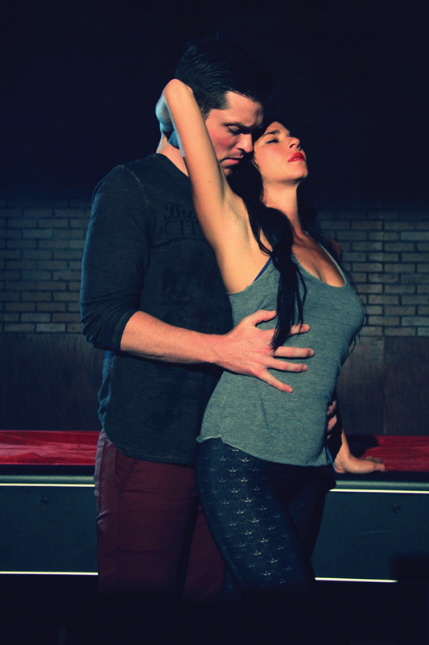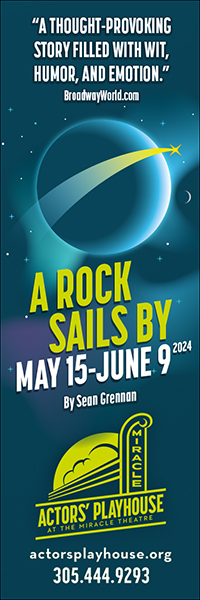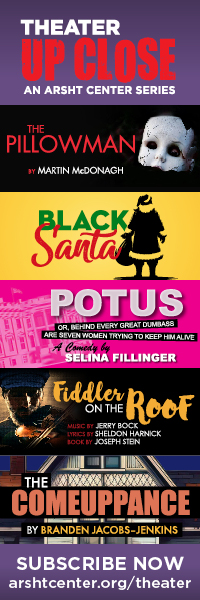
Chris Crawford and Blythe Gruda steam up the joint in Actors’ Playhouse’s Murder Ballad / Photo by Alberto Romeu
October and November are jammed with openings, as many as seven in one week. To find reviews of all the current productions, click on the “Reviews” tab in white letters in the teal bar in the upper left-hand corner.
By Bill Hirschman
Every couple of years, Actors’ Playhouse – home of the mainstream musical – says what the hell and mounts an edgy modern work that nourishes the creative soul of artistic director David Arisco and the theater’s more adventurous patrons.
And each time – with Violet, The Last Five Years, Songs For A New World, next to normal and the transcendent Floyd Collins – it results in don’t-miss theater for those who yearn for something with more red meat and more thought than revivals that the audience can already sing along with.
Add to that list this production of the off-Broadway cult rock opera Murder Ballad that mixes love, lust, loss, passion, fury, pain and violence in a fatal triangle as old as Mankind but as current as last week’s tabloid.
The frisson is ramped up because the action is staged in and around the audience in a reconfigured balcony auditorium transformed into a nightclub. The audience sits on all sides of the stage which has nightclub tables and chair for some patrons, an experiment in “immersive theater.” Actors leap up like rutting antelopes atop a bar and pool table, hungrily groping, frantically coupling and swinging fists inches from some of the paying guests.
But that’s just an extra topspin on what makes this one of the most exciting productions among Actors’ Playhouse’s 27 seasons.
Mercilessly insightful lyrics about a doomed search for self-validating love and excoriating driving music are delivered with courageous abandon by a quartet of highly skilled musical theater actors, whipped on by Arisco who has posted what may be a personal best in staging.
The title refers to a type of folk song that dates back to 19th Century Appalachia although its roots can be found in Europe hundreds of years earlier. But it is set among the disaffected rootless twenty- and thirty- something roaming today’s Manhattan. The fatal geometry remains timeless. They sing, “I’ll tell you a tale / where good does not prevail.”
Narrated by a sardonic Gothy bartender (Mariand Torres), the story follows Sara (Blythe Gruda), a downtown kind of girl deep into a volcanically sexual affair with another bartender Tom (Chris Crawford). Their bond seems unshakeable as they sing out in an East Village bar but both are wounded creatures. “I know where promises go,” Sara sings at one point. “Don’t make me a promise / people take them away / I don’t want you to love me / I just want you to stay.” Two years later, Sara breaks it off in a complex swirl of emotions and rationales.
Sara, who has banked her emotions, hooks up with a well-off uptown fella, Michael (Mark Sanders), a nurturing slightly older academic. They have a child and seem to settle down uptown. But the new seemingly perfect life cannot fill the congenital hole in Sara’s psyche. As one lyric has it, “Losing’s easy. Winning’s hard.”
She returns to the bar and takes up again the ill-fated relationship with Tom, even as she agonizingly tries to maintain her marriage to Michael. It’s a not spoiler to say that someone is killed – but the show keeps people guessing who will be the murderer and who will be the victim.
The authors almost have compassion for these mortals trapped on a collision course by impossible-to-satisfy emotional needs, reflected in one refrain, that people are “built for longing.”
Arisco did not see the show when it premiered in 2012 at Manhattan Theatre Club or the following spring when it played at the Union Square Theatre off-Broadway. The piece was created by Jonathan Larson Award winner and two-time Susan Smith Blackburn Prize finalist Julia Jordan and indie rock singer/songwriter Juliana Nash. But like so many cult musicals, its reputation grew thanks to an original cast recording that Arisco did hear.
The muscular music is its own animal, but it does echo Rent, Spring Awakening and next to normal. The lyrics are not as self-consciously witty as Sondheim, but they have a razor incisiveness about human frailty with such phrases as people being as “heartless as a hand grenade.”
The fatalistic story is intentionally dead straight ahead; other than the last moments of storytelling, you are expected to know, required to recognize what is happening and where it must lead as surely as a film noir of the 1950s or a mountain legend from the century before that. That may be the only shortcoming – the narrative is almost too spare and predictable to sustain the evening.
The superb actors wring out every drop of toxic emotion with their bravura voices, their agonized facial expressions, their sensual body language without ever overacting or hitting a false note. Gruda may be remembered as the sister in Floyd Collins or Songs For A New World). Crawford spent last season in Zoetic’s Assassins and Dramaworks’ The Lion in Winter. Sanders was the father in next to normal and the standout, pouty sullen Torres, is a standout from New York originally from Miami.
The script is really just the lyrics and some spare stage directions. So appreciate that Arisco has staged everything you see. Murder Ballad’s action has the propulsive feel of raging whitewater flowing around submerged boulders (or nightclub tables). The drive never lags even in the quieter moments.
Arisco creates memorable tableaus with the scenery he’s given. When the two old lovers meet again, they stand at opposite ends of a long bar. Then they leap on the bar top and work their way to each other, each under one of those retro lamps that look like an exploding atom. Quite apt, because a nuclear chain reaction resulting in fatal devastation is obviously inescapable.
But his command of movement without a choreographer is unparalleled. One scene occurs with the three lovers atop a pool table although ostensibly in different locations. Sara is depicted shuttling her lovemaking between both lovers, agonized at her deepening dilemma. She twists to one, then shifts her body to the other, and finally all three are caught intertwined in an impossible-to-sever triangle. It has to be seen to be fully appreciated.
Staging a show in the round is always a challenge and Arisco ensures most audience members never feel that they are seeing the actors’ backs too often. Even with performers singing to each other from the far ends of the performing area, he invisibly directs your attention where it should go, helped by Eric Nelson’s nimble lighting.
The rest of the creative team is also working at the top of their game. Mitch Furman’s sound makes every lyric crystalline. Ellis Tillman created costumes that seem as if they just came out of a Soho closet but which illuminate their personality. Gene Seyffer’s set design and Jodi Dellaventura’s set dressing/ props create the environment that must stand in for so many locations. This sung-through work is also a triumph for musical director Eric Alsford plus his whipcracking band Martha Spangler on bass, Roy Fantel on percussion and Sandy Poltarack on guitar.
With simulated if clothed sex, pepperings of profanity and a baseball bat brandished ominously from the opening chords, this is certainly is not everybody’s cup of Jack Daniels with a strychnine chaser. But for a crowd seeking vibrant, invigorating musical theater that feels relevant and up to the milli-second in its contemporaneity, you simply can’t do better than this.
Notes: Tickets are general seating except for subscribers who are let in early to choose their seats. The house opens a half-hour early so that patrons can buy drinks from the operating bars on stage and in the upstairs lobby while the band plays. Everyone’s taste is different, but we’d argue that to get the best view of Arisco’s staging, sit in the second row of the orchestra seats remaining in their original location in front of the mezzanine, or sit in the first row of the mezzanine.
Murder Ballad plays through Nov. 2 at the Actors’ Playhouse at the Miracle Theatre, 280 Miracle Mile, Coral Gables. Performances 8 p.m. Wednesday-Saturday, 3 p.m. Sunday except 2 p.m. Sunday the 15th. Running time 80 minutes, no intermission. Tickets for weeknights and matinees are $45, and on Friday and Saturday evenings $53. The theater offers a 10 percent senior discount rate the day of performance and $15 student rush tickets 15 minutes prior to curtain with identification. Visit actorsplayhouse.org or call (305) 441-4181.
To read a feature on how the auditorium was transformed, click here.










 A PaperStreet Web Design
A PaperStreet Web Design
